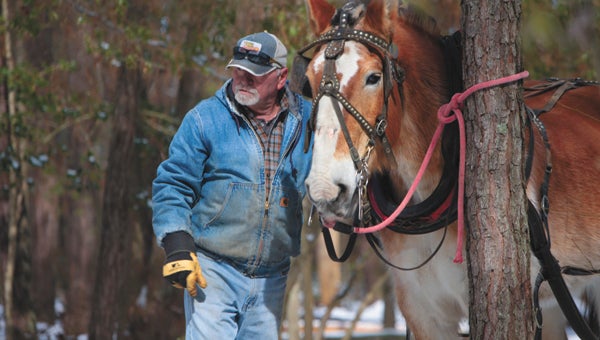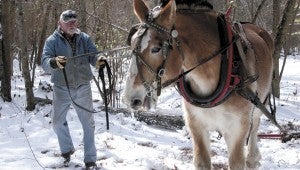Pulling with Ole John
Published 8:18 pm Tuesday, March 17, 2015

Greg Rice prepares to untie Ol’ John and lead the horse to a log that needs to be moved out of the woods during a logging job near Holland.
Logger turns to the past to ply his trade
A little frozen precipitation down amongst the loblolly doesn’t worry Greg Rice or “Ole John.”
Once Rice attaches a log to the chains pulled by the draft horse, the snow helps it slide across the ground more easily.
The 67-year-old’s father taught him logging with horses as a boy in Indiana County, out in Western Pennsylvania.
“Coal was king,” Rice says of those days.

Working from the right side of the horse is one of the first things horse loggers learn, Greg Rice says. “Otherwise, you’ll get pinched.”
Ole John snorts as he backs up to a snow-dusted log. “Whoa whoa whoa, John,” Rice coaxes. “Back up. Get up step. Back, John, back up.”
Like a thousand times before, Rice leans down and attaches Ole John’s harness to the chain hanging from the grab that he drove into the trunk of a felled tree with a small sledgehammer.
“We cut the mine posts, and we cut grade timber as well,” Rice says of the old days.
When he left to join the military, he swore he’d never again fell trees (his daddy taught him a precision cut the Swedes perfected) and drag them out of the woods with horses.
But a man’s blood, which nourishes the soul, never forgets.
Rice brought his family to Tidewater, settling in Suffolk in 1981, when Western Pennsylvania’s coalfields entered a decline.
When his father died, he decided to take his horses back into the woods again. “I was hooked,” he said.
About five years ago, Rice retired from a mechanized logging company he’d operated for many years. Ole John, a Percheron-mix considered a small draft horse, entered his life about the same time.
Rice feels certain the Amish bred and trained the horse, which he believes to be 18 or 19 years old. Ole John’s road manners are pretty good, traffic doesn’t bother him, and he took to cultivating, done during the summer, just as well as log dragging, his wintertime job.
“I wish I could take the credit for breaking him, but I was not the person who broke this horse,” Rice says. “Whoever did, did an outstanding job.”
Rice’s gray beard hasn’t grown icicles yet from the cold, but he gets back to work to keep warm, all the same.
Near the village of Holland, he and Ole John drag a half dozen pine “leaners,” dislodged by Hurricane Isabel in 2003, alongside a driveway through the woods, careful to line the ends up neatly.
Rice’s son will employ methods more modern to get the timber the rest of the way to the Franklin mill.
“Actually, they make diaper fill out of it,” Rice says.
It’s not a goldmine, or even one of those coalmines of Rice’s boyhood, but it’s a hobby that pays for itself, he says.
“It’s just something I really enjoy doing, and I do make a little bit of money,” Rice says.
“I think the key word in that sentence is ‘little.’”






